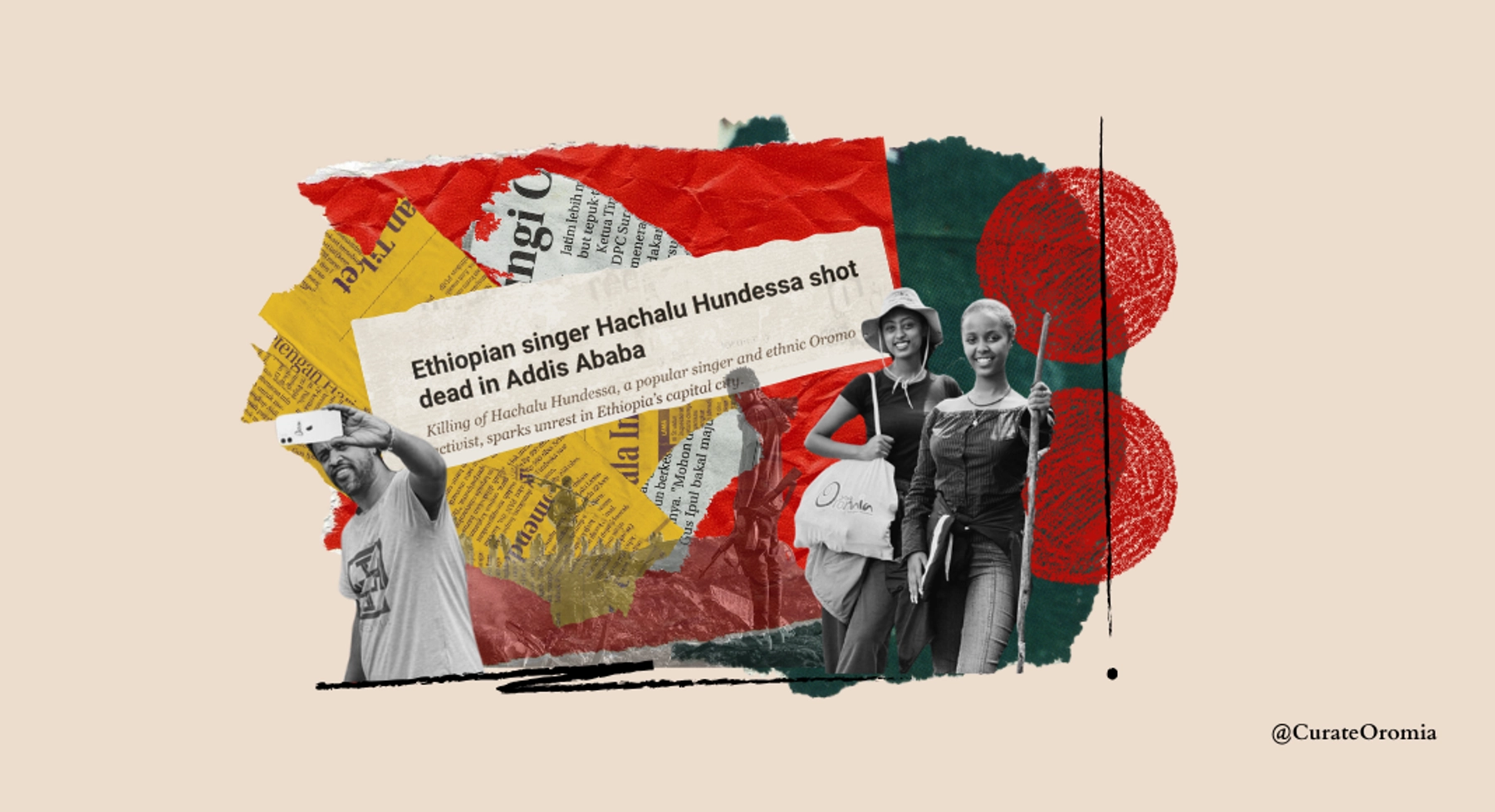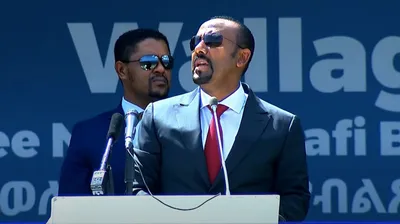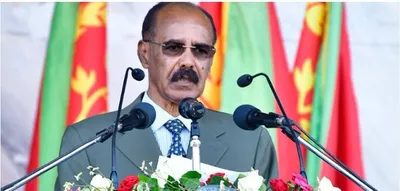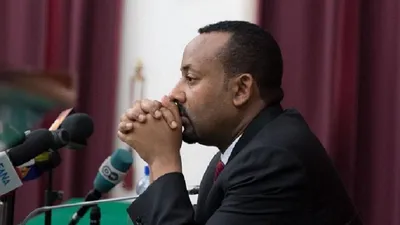The hypocrisy of regime apologists in Oromia needs a reality check

Abiy Ahmed recently met with Oromia’s top clergy, clan elders, and community organizers. During the meeting, the premier appeared defeated in front of a constituency that he had continuously belittled and disparaged throughout his tenure. Some could consider this tacit admission of guilt a victory. However, those of us who are tuned in Oromo politics did not miss the subsequent discussion which appears to suggest that we are governed by an Oromo-anchored politician and an Oromo-centered government. An “Oromummaa government” as Habeshas would put it.
Even though he is Oromo, Abiy’s longest war, which is still ongoing, began in Western Oromia and predates both the Tigray and Amhara wars. As a result of this risky enterprise, dozens, if not hundreds of thousands, have died, millions have been displaced, and an area that never experienced famine is now experiencing one.
Moreover, a simple examination of the regime’s track record in all other regions of Oromia reveals how appalling it is, ranging from induced famine in the south and east, to a covert crackdown in the southwest and terror campaigns and a lack of peace in Oromia’s north and center. Nonetheless, the regime has effectively managed to overcome this by mobilizing its Oromo supporters.
The regime’s supporters, mostly naive ‘urbanised’ youth, have convinced the world that the Ethiopian state is finally controlled by an Oromo regime. However, the facts remain that Oromos makeup 39% of Ethiopia’s population (50 million in 2024 if we go by the metrics of the 2007 census), 60% of whom have neither finished nor attended primary school, 54% live in poverty, hundreds cross the sea to the Arabian peninsula for a better life daily and 80% still reside in rural areas with limited access to health facilities and other vital services.
While Gammojji, or East Bale, was experiencing its worst drought in 50 years, the regime and its sycophants were boasting of a prosperous harvest season in Bale proper and chose to shamelessly promote Bale’s Mountains National Park as a tourist destination, all in an effort to fabricate a false narrative of ‘prosperity’ that ignores the harsh realities.
They were similarly promoting Borana culture overlooking the fact that Borana was just in the midst of a 5 year-long drought that induced famine, and at a time when government security forces were coercing the locals to donate to the war efforts in Tigray.
Visit Oromia
Many institutions are complicit in this campaign but Visit Oromia stands out, as it has spared no effort in serving this regime and cleaning up its image. When a certain locality in Oromia experiences human rights violations, drought, or displacement, Visit Oromia promptly dispatches its army of social media influencers to inspect the region’s beauty and exhibit its tourism potential. Under the guise of boosting Oromia’s tourism, this institution uses taxpayers’ money to whitewash the state’s crimes and promote a picture of stability and success. The messaging has a global reach; we all know that tourism flourishes in a stable country.
The evidence stares us in the face; we just need to ask the right questions. How did Visit Oromia manage to visit coffee gardens in Jimma without going through war-torn areas in Western Oromia? Did they need a military escort? How did they manage to go to Awash National Park, in the heart of the Karrayyuu homeland, when journalists and human rights organisations have been barred from accessing the area? Why Wanchi, Batu, and Langano now? Do they advise tourists about the roadblocks and checkpoints?
Indeed, perception is everything in politics. That’s why established governments, resistance movements, and terror groups, all alike, leave no stone unturned to preserve an image, granted that their application methods are on a spectrum. While the US, for example, uses Hollywood to explain away its war crimes in Iraq and Afghanistan, others use different platforms to maintain a certain image. This regime’s method is to promote tourism to signal stability and highlight the economic gains of a select few, all to hide its atrocities in Oromia.
You can spray a badger with musk; it still stinks. The regime understands that fact so it doesn’t rely on a single medium to whitewash its crimes. To that end, it employed a digital army to decimate half-truths. This digital army comprises co-opted urban youth, diaspora, and gullible youth who conflate public image with reality. A confusion aided by Abiy Ahmed being awarded the Agricola Medal for his “successful” efforts in global food security.
The digital army, overlooking a man who still uses food as a weapon of war, went on to celebrate him and his regime. To be fair, some apologists occasionally speak out after egregious events occur in Oromia. More recently, the regime’s Ethiopian Disaster Risk Management Commission (EDRMC), in charge of responding to evolving emergencies in the country, informed us that in Oromia alone, close to 7 million people require critical aid. While such an exposé is commendable, the agency’s numbers fall short of covering the full extent of the crisis, since no data is being collected in Western Oromia.
Evidently, the regime’s campaign is intended to magnify a sense of defeatism amongst the youth and forcibly place itself as the sole representative of the Oromo people.
While supporting a political party is a right, regime apologists must answer a critical question: how long can you support a party that lies, threatens, maims, and kills your people? Does tragedy need to visit you personally to awaken your conscience? Does your financial well-being surpass others’ actual well-being? Do we need to remind you that because of your efforts, the world believes Oromia is a heaven on earth, when in reality it is a hell on earth?
There is a saying in Afaan Oromoo that goes, “Dhugaa dubbachuu baattus, ni duuta,” which translates to, “Whether you speak the truth or not, you will die.” Regime supporters need to look deep into their souls and align themselves with their people’s interest and be their voice.
Otherwise, the famous Lutheran Pastor, Martin Niemöller’s postwar somber reflection “First they came for the socialists, and I did not speak out— Because I was not a socialist… Then they came for me—and there was no one left to speak for me,” will not be limited to describing the tragic fates of Taye Dendea and others who fell victim to the very party they once championed.
We need your support
We trust you found something of value in this article. If so, we kindly ask you to consider helping Curate Oromia continue its work.
If you believe in the importance of independent voices and honest reporting, we invite you to support our efforts through our GoFundMe campaign.
Every contribution, however small, goes directly to our writers and the expansion of our reach.
Thank you for your support.



